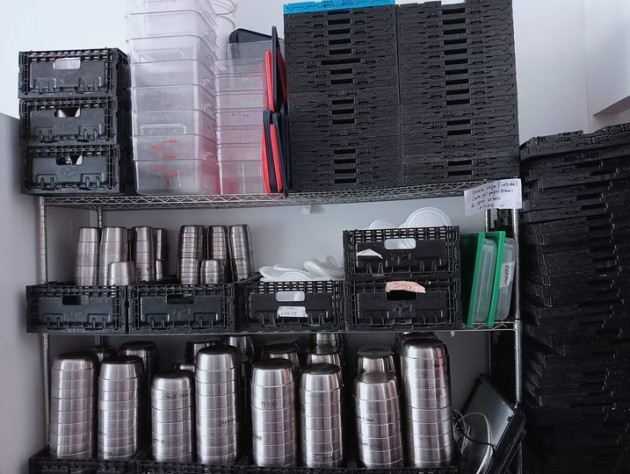Brunswick’s Wholefoods Unwrapped Collective has been recognised as the Community Champion winner in the Circular Economy Innovation category at the 2023 VIC Premier’s Sustainability Awards.
Wholefoods minimises food waste by eliminating packaging using durable and reusable containers from the paddock to the plate.
The company has been able to purchase a suite of reusable stainless-steel containers, crates and sturdy polycarbonate tubs to fulfil their customers’ orders of fresh wholefoods from suppliers.
By removing the dependence on energy-intensive, unnecessary packaging, this bold circular economy solution has not only diverted more than 15 tonnes of non-organic waste from landfill, but also influenced both food providers and customers to think differently about the impact of packaging waste on the environment.
“For food producers and our customers, seeing their food in reusable containers and that a system like ours can work seamlessly has brought about a realisation that copious amounts of packaging is just not necessary,” Gabrielle Pestinger, director at Wholefoods, told PKN.
“We have seen producers change their ways and encouraged other wholesale buyers to do things differently. We also know that many of our customers encourage other retailers who they buy from to try and make incremental changes, often using Wholefoods as an example of how it is possible.”
Wholefoods has three online shops (two for Brunswick for two different pick up days, and one for food relief at North Melbourne, which the company are conducting thanks to a grant from the City Of Melbourne. Every week, Wholefoods' customers make their orders in these online shops.
The company has 400+ products from around 50 local, small-scale and ethical producers, with 90 per cent of these makers providing produce in large reusable containers that Wholefoods returns to them week in and week out. The other 10 per cent of products come in home compostable packaging, with a very small amount of that 10 per cent being in bulk plastic, which is recycled with Reground. These are portioned into Wholefoods returnrs, jars and crates for pick up by its customers on their preferred pick up day.
"To be recognised as a Premier's Sustainability Award winner is a huge deal for us. Community and doing things differently for the right reasons has always been at the heart of what we do," added Pestinger.
"We've been true to our vision, not steering away from our core ethos in order to make millions or grow exponentially. Keeping it relatively small allows us to connect with our community in ways that are unique, stay true to the vision of no single-use packaging, and expand slowly to deliver zero waste, ethical produce to communities to which it was financially out of reach in previous years.
"To be recognised for all of this is both thrilling and humbling. We may be small but with this award we feel mighty."
Announcing the winners of the 21st Premier’s Sustainability Awards, Minister for the Environment Steve Dimopoulos said he was proud of the journey Victorians are taking to make the state more sustainable, and acknowledged the work of the leaders and change-makers to reduce waste, boost recycling, and use precious resources carefully.
Matt Genever, Sustainability Victoria’s interim-CEO, said he applauded Wholefoods for taking action to bring about positive change.
“Wholefoods has challenged the status quo and shown true leadership in Circular Economy Innovation. I feel inspired to hear their story and learn about the difference they’re making,” Genever said.
The Premier’s Sustainability Awards is Victoria’s most prestigious annual sustainability awards program celebrating the businesses, government and community leading the way in sustainable innovation and practices.
There are two winners for each of the six categories, which were refreshed in 2021 to align with the United Nations Sustainable Development Goals – the blueprint to achieve a better and more sustainable future for all.
The Community Champion award recognises individuals and small organisations, and the Industry Leader award celebrates medium and large organisations driving a sustainable future.
To view the profiles of all winners and finalists, click here.







